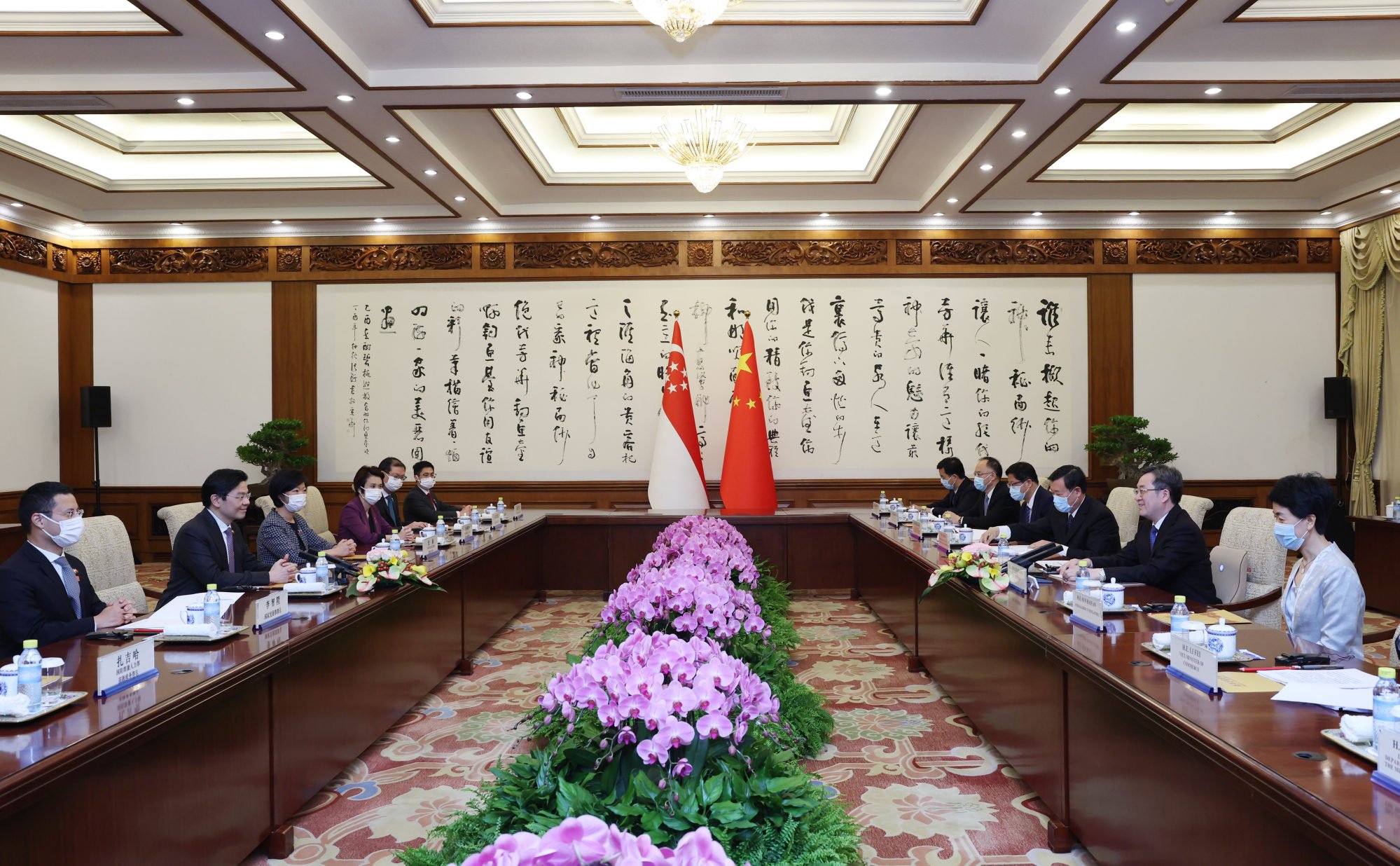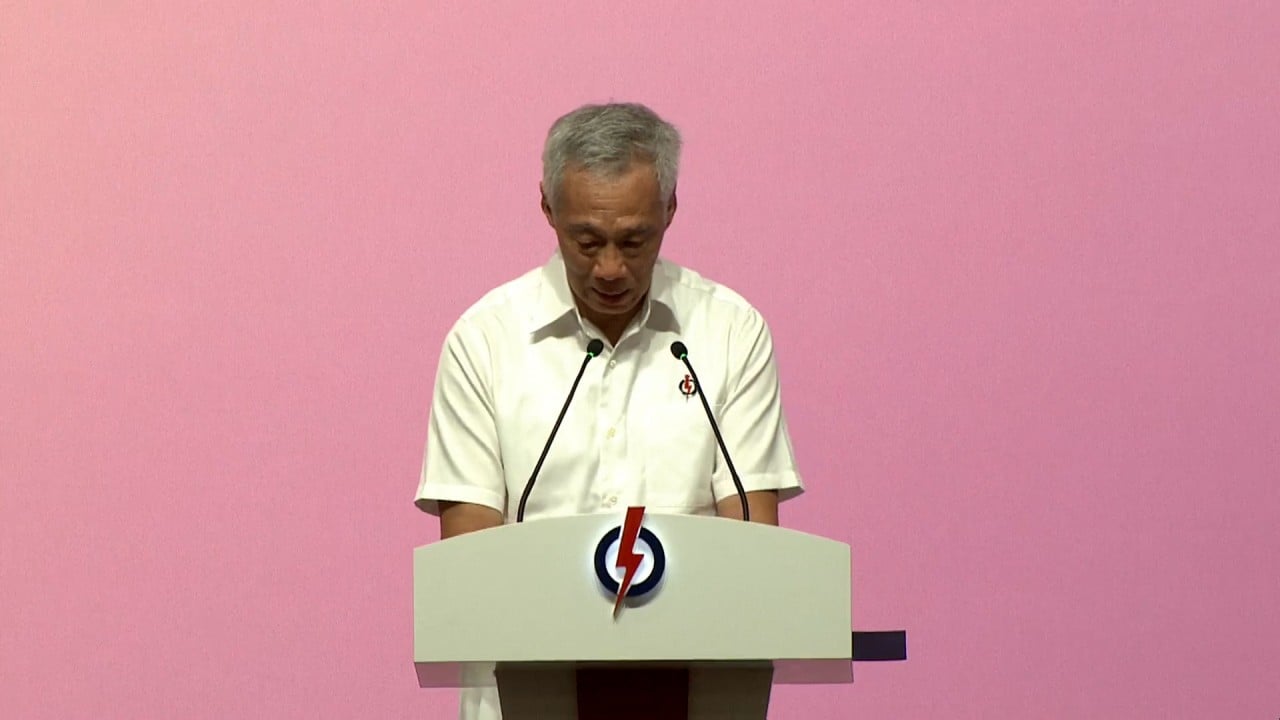
‘New era’ in Singapore-China ties? Incoming PM Lawrence Wong and Li Qiang agree to boost cooperation
- Both discussed potential areas of collaboration within the digital economy, renewable and clean energy sector
- Analysts say Wong’s four-day Beijing visit is a sign of ‘increased responsibility in international affairs’ as he is set to take over as Singapore PM by next November
The two officials discussed potential areas of cooperation within the digital economy, renewable and clean energy sector, as well as in other emerging areas, according to a statement from the Singapore Prime Minister’s Office (PMO).
Both also traded views on regional and global developments, and reaffirmed the importance of maintaining an open, inclusive and “rules-based regional architecture”.
Singapore’s Lawrence Wong cements ties with China leaders in ‘timely’ visit
Wong and Li “expressed satisfaction with the strong momentum of high-level exchanges between both sides as well as the successful convening of bilateral institutionalised platforms, such as the Singapore-China Forum on Leadership in September and the Singapore-China Legal and Judicial Roundtable last week”, the PMO stated.
Li also said both countries should continue to work under the “strategic guidance” of their leaders, according to the CCTV report, and that he was hopeful countries in the region would strengthen their cooperation in a new impetus for regional integration.
Wong also met Chinese Vice-Premier of the State Council He Lifeng to discuss ways to “broaden and deepen the scope of bilateral cooperation” in various sectors such as finance, according to the PMO statement.

Wong’s Chinese counterpart, Ding Xuexiang, was made the executive vice-premier in March following the Communist Party’s twice-a-decade leadership shuffle.
Both last met in May, when Wong was on his first official trip to Beijing after being made deputy prime minister in June 2022. Wong reaffirmed bilateral ties during the visit and also called on Chinese Premier Li Qiang.
“Together with my colleagues, we will also have bilateral meetings with Chinese leaders – looking forward to taking our partnership with China to greater heights,” he wrote.
Tomorrow will be Wong’s first time co-chairing the Joint Council for Bilateral Cooperation (JCBC), which is the highest platform for Singapore and China to review areas for cooperation.
Analysts said his elevation to co-chairmanship was only right, given that he would be the incoming prime minister, and the move recognises the importance of the JCBC mechanism for Singapore.
“The previous co-chair was Deputy Prime Minister Heng, who was then slated to replace Prime Minister Lee, so I think it is natural the new future prime minister helms this position now, underlying the level of importance Singapore places in the JCBC mechanism and in the overall importance of our ties with China,” said Dylan Loh, assistant professor in foreign policy at Singapore’s Nanyang Technological University.
On the scheduled meetings this week, Loh said: “This is an important opportunity for the new leadership in Singapore to also get to know the new leadership in Beijing after their Party Congress.”
Singapore must be alert to US-China rivalry for regional influence: ex-envoys
Wong will have to give flesh to this “new era”, analysts said, pointing out that Singapore had built up much political capital with the Chinese over the years but that its relations must be “carefully managed and continually cultivated”.
“Singapore has enjoyed a fairly deep reservoir of political capital built up by our first and second-generation leaders, but of course, this is not a given and needs to be carefully managed and cultivated,” Loh said.
Chong Ja-Ian, a political scientist from the National University of Singapore, noted that the late Lee Kuan Yew, Singapore’s first prime minister, had accumulated enormous political goodwill at a time when Deng Xiaoping, the late communist leader of China, sought deeper engagement with the rest of the world.
“Subsequent Singapore leaders established rapport with [Chinese] leaders through frequent contact, but none replicated the Lee Kuan Yew-Deng Xiao Ping relationship since [China and the Communist Party] had much more options for contact with politicians and business elites subsequently,” he said.
Singapore’s PM Lee will hand over power to Lawrence Wong ‘before next election’
But compared to previous prime ministers, who had portfolios in defence and a lengthier period in preparation for the top job, Wong seems to have had less security, foreign policy and defence-related issues, Chong said.
Wong was appointed deputy prime minister during a cabinet reshuffle last year, and is currently also the finance minister, after having done stints in national development and education.
“How he will gain experience and develop judgment in these areas is not yet known,” Chong said. “In fact, there is little known about his foreign policy orientation at this point, apart from cutting and pasting from Lee Hsien Loong’s existing policies, which were developed for a different, more globalised and less competitive world.”
Chong suggested Wong could build on the networks in finance and commerce-related spaces that he had nurtured during his tenure in his previous portfolios, including as finance minister.
Loh pointed out that the last two years of the pandemic had restricted opportunities for face-to-face engagement, and more such encounters would be needed to prepare Wong for premiership. “I do think that there is a greater desire for Singapore to let the deputy prime minister take the lead and take increased responsibility in international affairs as we move towards him taking over the prime minister role proper,” he said.
Alan Chong, a senior fellow at the S. Rajaratnam School of International Studies, said he believed Wong’s Mandarin proficiency was up to par in being able to engage the Chinese, comparable to predecessor Goh Chok Tong’s command of the language and Wong should be able to acquit himself well.
Singapore must weigh Asean interests amid US-China rivalry: historian Wang Gungwu
Analysts said they would also be observing how both sides deal with issues such as the management of investment and capital flows into Singapore, and disputes over the South China Sea and Taiwan.
“I would be watching the nature of economic engagement as well as Singapore’s willingness to maintain its position on rule of law, due process and an avoidance of coercion when it comes to contentious issues in the region, such as the South China Sea and Taiwan,” Chong said.
During his visit, Wong and Ding will also co-chair the Joint Steering Committee meetings of three major government-to-government projects in Suzhou, Tianjin and Chongqing.
The last iteration of the JCBC, which was co-chaired by former Chinese vice-premier Han Zheng and Singapore’s Deputy Prime Minister Heng Swee Keat, saw both sides agreeing to strengthen cooperation in various areas such as trade, finance, public health and pandemic response, with a total of 19 memorandums of understanding and agreements signed. It was the first physical forum in two years.
In the coming days, Wong will also meet Chen Min’er, Secretary of the Communist Party’s Tianjin Municipal Committee, and Minister of Finance Lan Fo’an, among others.
Over the past decade, China has been Singapore’s largest trading partner and Singapore has been China’s largest foreign investor, according to Singapore’s Ministry of Foreign Affairs website.
China was the top recipient of investment from Singapore in 2021, with S$195.5 billion (US$145 billion) invested, official data indicated.


